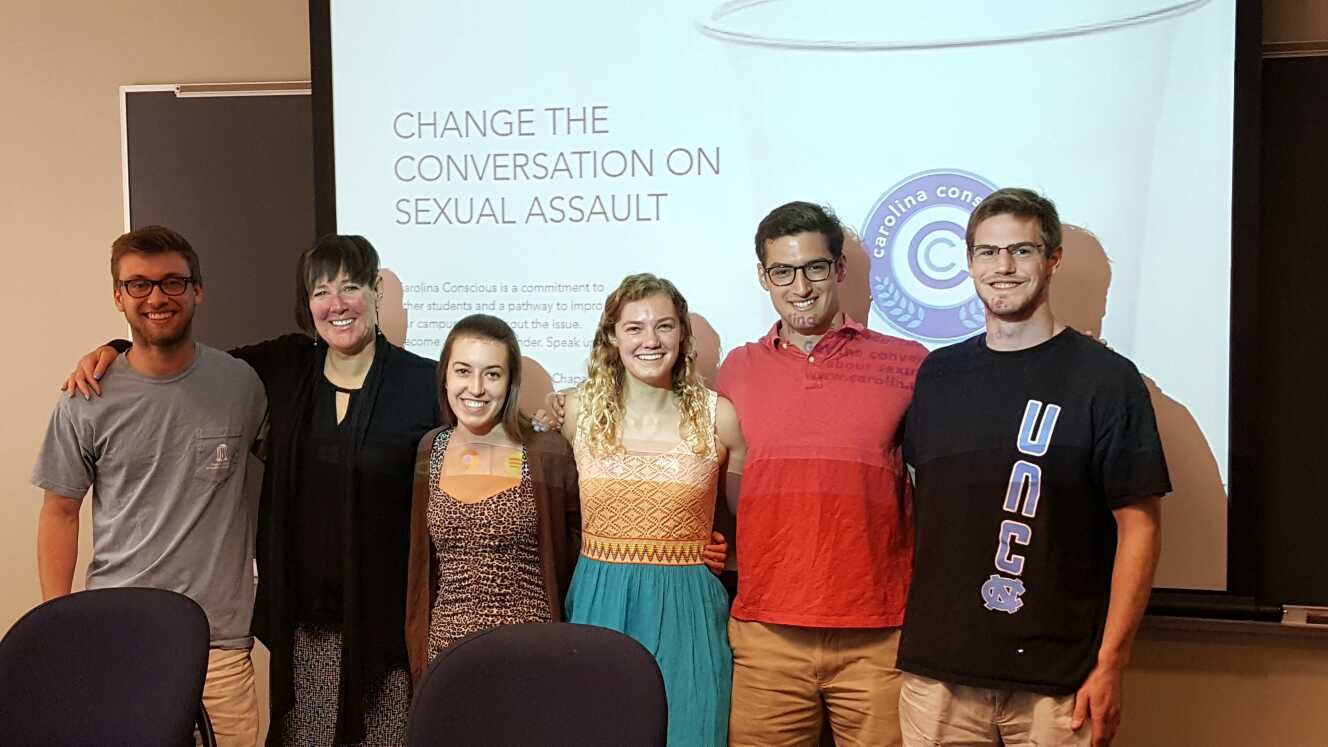
Carolina Conscious founders, left to right: Patrick Lowery, advisor Tracy Triggs-Matthews, Deanna MacCormac, Lisa Dunleavy, Asher Lipsitz, and Ben Director. Courtesy photo.
A club project launched by University of North Carolina Kenan-Flagler Business School students to address environmental concerns and raise awareness of sexual assault has grown into a campus-wide business — and now its founders are beginning to think about expanding beyond their school.
Deanna MacCormac and Lisa Dunleavy, rising seniors and business majors at UNC Kenan-Flagler, decided last spring to find an environmentally friendly alternative to the ubiquitous red Solo cups found on campuses across the country. The idea grew out of their membership in the campus Net Impact Club, which cultivates values-driven business leaders and helps them grow into social and environmental change-makers.
When classmates heard about MacCormac and Dunleavy’s interest in cups, a friend introduced them to three other students who were also trying to spark change through party products. Patrick Lowery, a math and economics major, Asher Lipsitz, a journalism major, and Ben Director, another business major at UNC Kenan-Flagler, were looking to spread awareness about campus sexual assault by replacing traditional party cups with those emblazoned with an awareness message.
SHOWING UP AT FRATERNITIES, IN DORMS
The five students teamed up and founded Carolina Conscious as a campus club. Once they designed and found a way to mass-produce the cups, the business was born. In the last month of school, Carolina Conscious sold 20,000 cups.
“It got too big for us not to do it,” MacCormac says. “We’re trying to encourage a culture shift. Carolina Conscious is helping people do their part, without them having to take a very big step themselves.”
From the start, Carolina Conscious has focused on fraternity and dormitory parties. Last spring, MacCormac says, five or six frats and two or three dorms were using their cups. When school starts again in the fall, they plan to talk to more frats about incorporating the cups into Rush events.
THE ENVIRONMENTAL SIDE
On the Carolina Conscious website, the two missions are explained with large infographics. On the environmental impact page, there are images of 10 minivans with text reading, “Each year, we use and throw away over 100,000 plastic cups. That’s enough cups to fill over 10 minivans! Each lasts hundreds of years in the landfill without decaying.”
Carolina Conscious cups, on the other hand, are made of corn-based bioplastic that can decompose in 50 days. They order the cups in bulk and sell them in smaller numbers to groups throwing parties on campus.
For now, MacCormac says, the cups are priced competitively with traditional 16-ounce plastic cups sold at local retailers. This way, she says, there is no reason not to use Carolina Conscious cups instead of red Solo cups. “We have a slim profit margin because we really want people to use them,” she says.
THE SEXUAL ASSAULT AWARENESS SIDE
Lowery, Lipsitz, and Director designed a logo that is printed on the cups, directing party-goers to their website. “The cups say to get the conversation started on www.carolinaconscious.org, which we hope will drive more people to the site,” MacCormac says. “The site has a lot of info.”
On the Conscious Change section of the website, for example, Carolina Conscious provides data specific to UNC-Chapel Hill that was published in 2015 by the Association of American Universities’ Campus Climate Survey on Sexual Assault and Sexual Misconduct. It shows that one in four female undergraduates, and one in 15 male undergraduates, have been raped or sexually assaulted.











Questions about this article? Email us or leave a comment below.